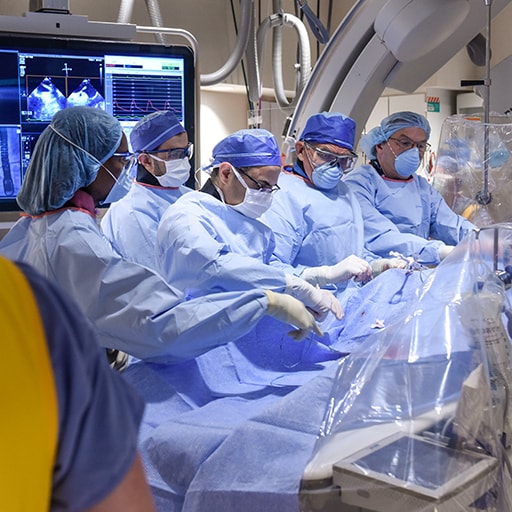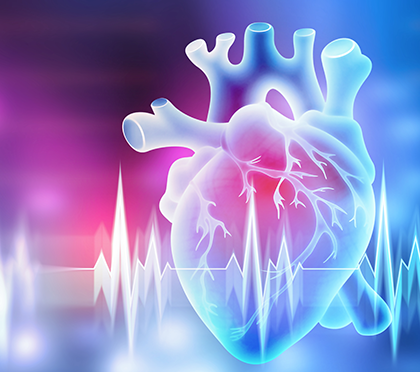How Dr Garcia, MD supports long-term heart wellness with expert care
How Dr Garcia, MD supports long-term heart wellness with expert care
Blog Article
Recognizing the Importance of Cardiology in Modern Healthcare Providers
Cardiology plays an essential function in modern-day healthcare, specifically as cardiovascular disease remains to be the leading root cause of mortality worldwide. Advancements in diagnostics and therapy have actually transformed patient care, allowing earlier interventions and enhanced outcomes. Furthermore, the shift in the direction of precautionary cardiology encourages individuals to manage their health and wellness proactively. As technology remains to develop, the integration of cutting-edge services may further redefine cardiology's effect on public wellness, prompting a closer assessment of arising fads and their implications.
The Prevalence of Heart Condition and Its Effect On Public Health And Wellness
Although heart condition continues to be the leading reason of death around the world, its influence expands much beyond individual clients to affect public wellness systems and economic climates. The high occurrence of cardiovascular disease places a substantial stress on health care resources, requiring increased funding for avoidance, rehab, and treatment programs. Public wellness initiatives should deal with risk factors such as weight problems, cigarette smoking, and inactive way of livings, which add considerably to the rising occurrence of heart conditions.Moreover, the financial worry connected with cardiovascular disease is tremendous, incorporating not just direct medical prices but additionally indirect expenses associated with lost productivity and premature mortality. Neighborhoods face challenges in taking care of these costs, commonly bring about variations in medical care gain access to and results. As the population ages and lifestyle-related threats remain to escalate, the urgency for reliable cardiology interventions becomes vital. Consequently, attending to cardiovascular disease is not only an issue of specific wellness but likewise a vital public wellness concern.
Advances in Heart Diagnostics and Imaging Techniques
Current developments in cardiac diagnostics and imaging methods have actually reinvented the area of cardiology, improving the capability to monitor and detect heart illness. Methods such as heart MRI, CT angiography, and echocardiography have ended up being progressively advanced, providing thorough pictures of heart frameworks and features. These methods permit the very early identification of problems like coronary artery condition, cardiac arrest, and valvular disorders.Moreover, improvements in non-invasive diagnostics, such as wearable innovation and remote surveillance tools, have actually equipped people and health care service providers. These devices facilitate real-time monitoring of heart rhythms and various other vital signs, resulting in timely treatments. In addition, synthetic knowledge is being incorporated right into imaging evaluation, enhancing precision and efficiency in diagnosis.
Innovations in Therapy Choices for Heart Conditions
Current developments in cardiology have actually led to significant innovations in therapy alternatives for heart disease. These include advanced medical strategies that improve step-by-step results and arising medications that use new opportunities for treatment. As the field progresses, these innovations play an essential function in boosting individual care and results.
Advanced Surgical Techniques
Innovations in medical techniques have actually changed the landscape of cardiology, using brand-new expect clients with heart disease. Minimally intrusive treatments, such as catheter-based interventions, have considerably reduced recovery times and healthcare facility keeps. Techniques like robotic-assisted surgery improve accuracy, allowing doctors to navigate complex anatomical structures with higher precision. In addition, advancements in imaging technology help with real-time visualization during procedures, enhancing results. Transcatheter aortic shutoff substitute (TAVR) exhibits a development in dealing with aortic constriction, allowing valve replacement without open-heart surgery. Additionally, hybrid approaches that combine surgical and catheter-based approaches give customized options for different cardiac issues. These advanced medical strategies not just enhance patient safety yet additionally broaden treatment options, emphasizing the essential duty of advancement in contemporary cardiology practices.
Arising Treatments and medicines
As the landscape of cardiology remains to evolve, arising treatments and medicines play a pivotal duty in improving treatment alternatives for heart disease. Innovations such as unique anticoagulants and advanced lipid-lowering representatives have changed the administration of heart diseases, significantly reducing person morbidity and mortality. In addition, the advancement of gene therapies and regenerative medication offers encouraging opportunities for dealing with conditions previously deemed irreversible. Clinical trials are continually exposing the efficacy of these treatments, pressing the limits of typical treatments. The assimilation of digital health and wellness modern technologies facilitates individualized medication, allowing for tailored treatment strategies based on hereditary and way of life elements. Collectively, these innovations underscore the dynamic nature of cardiology, enhancing person end results and redefining standards of care in contemporary medical care.
The Duty of Preventive Cardiology in Patient Care
Preventive cardiology plays a necessary duty in person care by focusing on the identification of risk elements that contribute to heart illness. Via way of living adjustment methods and very early discovery techniques, doctor can effectively decrease the incidence of cardiovascular events - Cardiologist near me. This proactive approach not only enhances patient outcomes but also advertises lasting wellness
Danger Aspect Identification
While heart diseases continue to be a leading source of morbidity and death worldwide, efficient risk factor recognition acts as a foundation of precautionary cardiology. Identifying threat variables such as high blood pressure, hyperlipidemia, family, and diabetes mellitus history is important for very early intervention. Healthcare specialists use various evaluating methods to review these aspects, allowing for customized safety nets. Furthermore, understanding an individual's lifestyle options, such as cigarette smoking and physical inactivity, better educates danger evaluations. This extensive examination enables clinicians to establish tailored treatment strategies focused on mitigating dangers. By focusing on danger variable identification, medical care systems can enhance individual outcomes and decrease the total burden of heart diseases, ultimately adding to boosted public health strategies and resource appropriation.
Lifestyle Adjustment Approaches
A multitude of research studies highlights the important function of way of life alteration strategies in decreasing heart disease risk. These techniques include nutritional adjustments, increased exercise, cigarette smoking cessation, and weight administration. By taking Continue on a heart-healthy diet regimen abundant in fruits, vegetables, whole grains, and lean healthy proteins, people can lower cholesterol levels and blood pressure. Routine exercise reinforces the heart and improves overall cardiovascular health and wellness. In addition, giving up smoking greatly decreases the risk of cardiovascular disease and improves recovery rates for those with existing conditions. Weight management further adds to cardio wellness by minimizing various other danger aspects such as diabetic issues and hypertension. Executing these lifestyle changes not just advertises private well-being but also works as a keystone of precautionary cardiology in client care.
Very Early Discovery Methods
Lifestyle alterations substantially contribute to decreasing heart disease dangers, but they are most reliable when coupled with early detection strategies. Precautionary cardiology emphasizes the value of determining potential heart concerns prior to they escalate right into major conditions. Methods such as blood pressure surveillance, cholesterol screening, and advanced imaging innovations like echocardiograms play important roles in examining cardio health and wellness. Biomarkers and genetic screening also boost the precision of very early detection, enabling tailored preventative techniques. Normal cardiac threat assessments encourage health click for info care providers to interfere proactively, potentially stopping cardiovascular disease and strokes (Cardiologist near me). By integrating these very early discovery methods right into regular care, individuals can take advantage of timely way of life treatments and targeted treatments, eventually boosting and improving outcomes lifestyle
Integrating Modern Technology Into Cardiology Practices
As developments in innovation remain to improve numerous areas, the integration of ingenious devices and systems right into cardiology practices has ended up being crucial for enhancing client care and results. Telemedicine systems allow cardiologists to monitor clients remotely, enhancing accessibility to care while minimizing the worry on medical care facilities. Wearable devices, such as smartwatches, enable constant heart rate tracking, informing both medical professionals and people to possible concerns in real-time. In addition, expert system (AI) is being made use of to assess substantial quantities of heart data, assisting in very early medical diagnosis and tailored therapy strategies. Advanced imaging methods, including 3D echocardiography, improve visualization of heart structures, leading to more precise treatments. Digital health and wellness records (EHRs) improve patient details monitoring, making sure that cardiologists have instant access to essential data. With each other, these technological developments are transforming cardiology, advertising positive management and improved wellness results for patients with cardio problems.
The Relevance of Client Education And Learning and Interaction
Patient education and learning and engagement play an essential role in the administration of cardiovascular health and wellness. By equipping individuals with knowledge regarding their problems, treatment alternatives, and lifestyle modifications, doctor encourage people to take an active function in their treatment. This proactive technique can lead to enhanced adherence to suggested medications, dietary adjustments, and exercise programs, inevitably reducing the danger of complications.Engagement likewise cultivates a strong patient-provider connection, motivating open interaction and trust. When clients feel educated and entailed, they click now are more probable to voice worries and ask inquiries, which can lead to better medical results. In addition, instructional sources, such as workshops or digital platforms, can enhance understanding and promote self-management techniques. Generally, focusing on individual education and learning and involvement is essential for enhancing cardiovascular health, enhancing lifestyle, and minimizing health care expenses related to heart diseases.
Future Patterns in Cardiology and Their Prospective Effect

Often Asked Questions
What Lifestyle Changes Can Lower Heart Problem Threat?
The current inquiry addresses way of life modifications that can significantly decrease cardiovascular disease risk. Cardiology Jupiter. Adopting a well balanced diet plan, engaging in regular exercise, keeping a healthy weight, managing stress and anxiety, and preventing tobacco can especially enhance cardiovascular wellness
Exactly How Can I Recognize Very Early Indications of Heart Problems?
Identifying early signs of heart issues involves surveillance signs such as upper body discomfort, shortness of breath, tiredness, and irregular heart beat. Timely recognition of these indicators can motivate required clinical assessment and treatment for much better end results.
What Are the Differences In Between Cardiologists and Cardiac Surgeons?
The distinctions between cardiologists and heart doctors depend on their duties; cardiologists mainly detect and manage heart disease via non-invasive methods, while heart surgeons do surgeries to remedy architectural heart problems. Each plays an essential, distinct function.

Exactly how Typically Should I Get My Heart Health And Wellness Checked?
The frequency of heart wellness checks differs based upon private risk factors. Generally, grownups must go through evaluations each to 2 years, while those with status quo might need more frequent analyses as encouraged by healthcare professionals.
What Duty Does Genetics Play in Heart Disease Threat?
Genetics greatly affects cardiovascular disease risk, with domestic patterns suggesting inherited problems. Particular genetics can predispose people to high blood pressure, cholesterol issues, and various other cardiovascular troubles, highlighting the value of genetic testing in evaluating heart wellness. Heart disease continues to be the leading cause of fatality internationally, its impact prolongs far beyond specific clients to influence public health and wellness systems and economies. Public health and wellness campaigns should address danger variables such as weight problems, smoking cigarettes, and sedentary way of livings, which contribute considerably to the climbing incidence of heart conditions.Moreover, the financial burden connected with heart condition is immense, including not just straight medical expenses yet also indirect costs connected to shed productivity and early death. Preventive cardiology plays a vital duty in patient care by focusing on the recognition of threat factors that contribute to heart illness. Fabricated knowledge (AI) and machine discovering are boosting diagnostics and person monitoring, enabling early detection of heart illness. The distinctions in between cardiologists and cardiac specialists exist in their duties; cardiologists mainly diagnose and manage heart problems via non-invasive methods, while cardiac surgeons carry out surgical procedures to fix structural heart issues.
Report this page